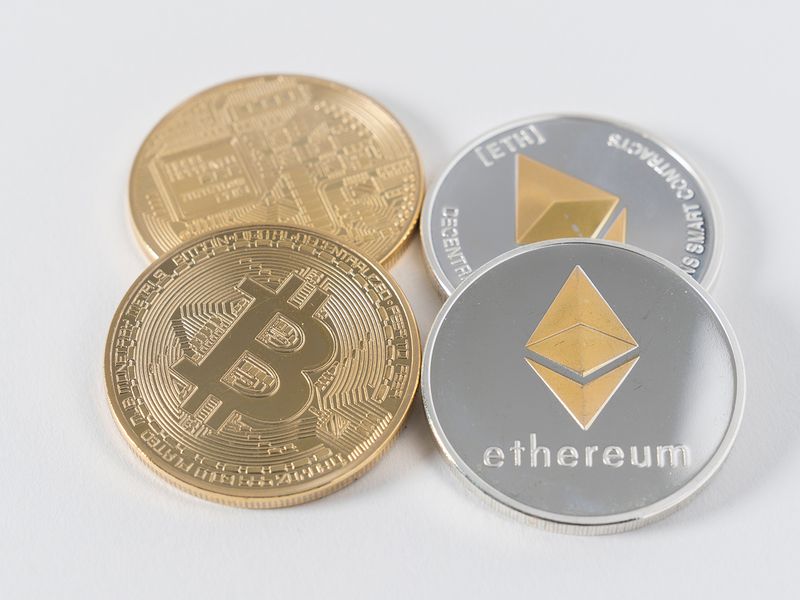The Global Contenders Trying to Displace the Dollar
Could the dollar be replaced by a single new, dominant currency like China’s DCEP, or is a multipolar currency world more likely? Presented in documentary podcast and full transcript formats below.
For more episodes and free early access before our regular 3 p.m. Eastern time releases, subscribe with Apple Podcasts, Spotify, Pocketcasts, Google Podcasts, Castbox, Stitcher, RadioPublica, IHeartRadio or RSS.
“Some of the greatest theorists about money…thought it better to be multiple competing currencies rather than a single global standards, and there were plenty of periods in history where that was the case. Standardization of money came relatively late to the world. One of the lessons of history is that with globalization comes a tendency for a particular currency to become the number one dominant currency for transactions, for trade, for international reserves. A great question to ask is: globalization enters this phase of crisis: will there be some other transition from the dollar to another currency? Or could we see a reversion to a multipolar, multi currency world?”
Niall Ferguson
On the first episode of Money Reimagined, we looked at the strange paradox of the U.S. dollar. On the one hand, massive stimulus fueled by “money printer go brrr” should suggest for inflation. At the same time, however, there is no denying the dollar is stronger than ever, rising in value compared to other currencies in spite of that inflation potential.
There is a sense among many, however, that this strength is relative, temporary and, above all, unsustainable. In a world where a global dollar-based monetary system does not serve the interest of the world, what replaces it?
This episode is about the sovereign contenders – in other words, the currencies that would work through existing power structures and paradigms but replace the dollar with something else.
We look first at the euro. Created in the wake of the Cold War to bind a newly reborn Europe in shared identity and economic destiny, it entered the COVID-19 crisis in a beleaguered state. Brexit had taken the most valuable economy out of the union and flagging economies within it created significant fragility. What’s more, Europe simply doesn’t have the monetary tools available to a country like the United States. Peter Zeihan, the geopolitical strategist and author of “Disunited Nations,” explained it like this:
“There’s nothing that the Europeans can do in terms of stimulus spending without raising debt. Even if they decided to do something like QE – which last time took years – they would now have to have the debate over who gets how much. The Europeans are having a hard time raising the capital necessary for dealing with this crisis, whereas the US can just flip a switch.”
CoinDesk Chief Content Officer Michael Casey pointed out the European Union is also dealing with questions of political validity, with COVID-19 exacerbating a fundamental issue.
“The capacity of the EU to act in unison and the common interest the EU is supposed to represent kind of fell apart. All of a sudden, borders got shutdown and it was each nation to him or herself. So the EU’s validity to manage this has been challenged. COVID is a force for decentralizing power. From a currency perspective, the value of these currencies are political questions. Therefore the EU’s political validity is being questions right now. I’m not sure that’s going to be a very positive environment for the euro.”
The next contender profiled is the Libra project. While much of the initial conversation about the libra currency focused on the past transgressions and potential political illegitimacy of its founding organization of Facebook, for economists and system thinkers, the most powerful idea contained in the project was the idea of a global currency standard backed by a basket of the world’s fiat rather than pegged to any single currency. In many ways, this harkened back to John Maynard Keynes’ Bretton Woods proposal for a bancor – separate from the individual currencies of nations around the world. Indeed, in many ways, the most interesting impact of Libra initially was getting global central bankers like Mark Carney to propose their own “synthetic hegemonic currencies.”
Finally, we look at China’s digital currency or DCEP. Is it an unbelievable surveillance honeypot? An attempt to front run the West on a key technological innovation? A method of extending economic spheres of influence? Or is it all of the above?
Listen to Money Reimagined – Episode 2 to find out.
Produced by NLW and Adam B. Levine. Edited, Scored and Announced by Adam B. Levine with production assistance from the rest of the team at CoinDesk.
Consensus: Distributed: CoinDesk’s Michael Casey and NBTV’s Naomi Brockwell host the “Money Reimagined” virtual panel on May 11 at 9 a.m. ET, with guests including Consensys’ Joseph Lubin, former Commodity Futures Trading Commission Chairman Chris Giancarlo and the World Economic Forum’s Sheila Warren. Register here.

For more episodes and free early access before our regular 3 p.m. Eastern time releases, subscribe with Apple Podcasts, Spotify, Pocketcasts, Google Podcasts, Castbox, Stitcher, RadioPublica, IHeartRadio or RSS.
Transcript
Announcer:
Welcome back to The Breakdown: Money Re-Imagined, a special podcast micro series in the run up to Consensus:Distributed, a free to attend virtual event from May 11th through the 15th hosted by CoinDesk. Money Re-Imagined is about the battle for the future of money and the post COVID-19 world and it’s a hell of a story. This episode is sponsored by ErisX, the Stellar Development Foundation and Grayscale Digital Large Cap Fund. Here’s your host NLW.
NLW:
Welcome back to the breakdown. So on the first episode of this special money reimagined series, we looked at this strange, almost schizophrenia narratives around the U S dollar. On the one hand: money printer go BRRRRRRRR massive stimulus and increasingly exotic forms of QE would suggest for future inflation right? On the other however, in practice the dollar has gotten nothing but stronger and become even more in demand during the crisis.The goal of that episode was to maybe piece through and figure out how these two things, how these two narratives might not be mutually exclusive.
NLW:
On this episode, however, we are turning our attention and instead we’ll be looking at the contenders in this battle for the future of money. These are the insurgents that would replace the dollar in the global order and in particular in this episode, the insurgents who would replace it in an inside the system formal way. So before we fully dive in, let’s get some historical context from Niall Ferguson. He’s a historian and senior fellow at Stanford’s Hoover Institution and the author of works like The Ascent of Money. It wasn’t always a foregone conclusion that the world would be organized around a single dominant standard like the U S dollar. In fact, as Ferguson argues here, this was a byproduct of globalization.
Niall Ferguson:
Some of the greatest theorists about money… Hayek, for example, Friedman, thought it better for the to be multiple competing currencies rather than a single global standard. And there were plenty of periods in history when that was the case. There were multiple currencies in, for example, 17th century Europe, and there were in fact many different forms of payment across the United States in the 19th century. Standardization of money came relatively late to the world. It began with the British gold standard, which by around 1900 was a global standard pegging currencies to a specific quantity of gold. I think one of the lessons of history is that with globalization comes a tendency for a particular currency to become the number one dominant currency for transactions, for trade, for international reserves. In the 19th century, it was the British pound. In the 20th century, it became the U S dollar.
Niall Ferguson:
And a great question to ask is globalization enters phase of crisis. Will there be some other transition from the dollar to another currency or could we see a reversion to a multipolar, multicurrency world of the salt that we’ve seen in previous eras.
NLW:
“A unipolar monetary order” was a byproduct of globalization. Globalization is being unwound right now and unwound in an accelerated fashion, thanks to COVID-19 so when it comes to the U S dollar system, does this mean an unraveling too, and if so, who might be stepping up? That’s really the whole point of today’s episode. Let’s look first to the Euro. If the Genesis of the global dollar standard that we’re on now was the end of world war two and the Bretton Woods conference, the Euro came about as Europe tried to Reforge both a shared identity and a shared economic destiny after the fall of the Soviet union. Agreed upon in principle in the Maastrichtt treaty in 1992, the Euro would come into being real form.
NLW:
About a decade later. It quickly became the second most widely used reserve currency after the U S dollar, but as Europe and the Euro came into the COVID-19 crisis, both were on kind of shaky ground. Brexit had taken the most valuable economy out of the European union and flagging economies within the union created pretty significant fragility. In this clip, we revisit comments from the geopolitical strategist and author of Disunited nations, Peter Zeihan.
Peter Zeihan:
The degree to which the United States is the sole… Sole store of value in the global system was already pretty extreme in the last few years, and it’s only gone up during the crisis because there’s nothing that the Europeans can do in terms of stimulus spending without actually raising debt. Even if they decide to do something like QE like the United States has done, they don’t have to have to have the debate, which last time took years over who gets how much of whatever the stimulus spending happens to be and no one wants to throw money… Any more money than they have to in the black hole that has become Greece, Italy, despite the death rate and how tragic that is has had 30 years to clean up their banking sector, they’ve actually gone the wrong direction and no one in Europe wants to be responsible for paying for that.
Peter Zeihan:
So aside from some German debt, because there’s actually a shortage of high quality debt in Europe, the Europeans are having a hard time raising the capital that is necessary to deal with this crisis, whereas the U S can just flip a switch and that’s what we’ve done. If the Euro continues to exist, it will exist over a shriveled demographically spent economy that is no longer capable of exports. That’s not a functional bloc and that’s their best case scenario. More likely, this whole thing just breaks up. And the United States basically absorbs a huge amount of capital from Europe.
NLW:
CoinDesk chief content officer, Michael Casey takes this argument around the Euro farther saying in some ways it’s inherently a question of political validity.
Michael Casey:
So the, the Euro is actually a really interesting way to think about some of the other questions. Those of us who are interested in cryptocurrencies and new currency designs go about perceiving things because in of itself, right. It was a really interesting experiment. It’s an entirely different way of thinking about issuance of a sovereign currency because it’s a Federation of otherwise sovereign Nation States who are yes, are bound with some level of political unity but within the EU, but are otherwise independent but have this one common currency. And that disconnect between sort of the local political power and the reduced political power at the EU level… And the common currency is actually at the heart of the Euro crisis that we saw maybe 10 years ago. The capacity of the EU to act in unison and the common interest that the EU was supposed to represent kind of fell apart, right?
Michael Casey:
Everybody was each to their own, Italy was unto its own Spain with central. All of a sudden borders got shut down. It was all each nation to him or herself as the pandemic took hold. So that is kind of validity as an entity to manage this I think has been challenged somewhat. COVID-19 is a force for decentralizing power. It’s pushing interest down to the local level. And so I think from a currency perspective, the value of these currencies are political questions. Therefore the EU’s own sort of political validity is being challenged right now. I’m not sure that’s going to be a very positive environment for the Euro.
NLW:
Of course, the contenders in the battle for the future of money aren’t just other sovereign currencies that exist today, like the beleaguered Euro. Coming up after the break, we turn our attention to something more digital and potentially even more disruptive.
Announcer:
Support for this podcast and this message come from ErisX with ErisX. You can trade spot and regulated futures on cryptocurrencies through a licensed US-based exchange. ErisX believes in fair access for all. Sign up today to take advantage of zero fees and learn more at ErisX.com/Consensus. This episode is also sponsored by the Stellar Development Foundation. The Stellar network connects your business to the global financial infrastructure. Whether you’re looking to power a payments application or issue, digital assets like stablecoins or digital dollars, Stellar is easy to learn and fast to implement. Start your journey today at stellar.org/coindesk.
Libra Announcement Video:
Remember when these were fast and these technology has improved the world around us.
Libra Announcement Video:
So why is it simple to send one of these in an instant but not money? What if we made money truly global, stable and secure? What if everyone was invited to the global economy with access to the same financial opportunities? Introducing Libra, a new global payment system designed for the digital world, backed by the belief that money should be fast for Opai and Lagos. Simple for Saul’s family business in Manila. And secure for Betsabe when sending money home to Mexico City. It’s powered by blockchain, making it safe and accessible no matter who you are or where you’re from….
NLW:
In July of 2019 Facebook stunned the financial world with the announcement of Libra. Libra was a new global money to be governed by an association of corporations and nonprofits. Importantly, and disruptively Libra wouldn’t get it stability from a peg to a single fiat currency, but instead would be backed by a basket of fiat currencies. Now, much of the ensuing attention focused on questions of Facebook’s legitimacy in leading the project. They had outstanding and unresolved criticism around data practices and in the U S in particular, there were huge issues with the government vis-a-vis the 2016 elections. For economists and systems thinkers however, it was this basket of currencies idea that was the most interesting thing. For some, it looked like a modern day version of the Bancor, a global pan-national currency, first proposed by John Maynard Keynes at Bretton Woods. Macro researcher. Luke Grommen provides a quick synopsis of that proposal
Luke Grommen:
At the end of world war II at Bretton Woods, there were two options. John Maynard Keynes proposed something called the Bancor, which was a neutral settlement asset that floated in all currencies and would have basically prevented systemic deficits and surpluses from building up over time that we have since seen. Because we didn’t go with the Bancor. We went with a proposal from the United States as voiced by Harry Dexter White, which was the dollar is the center of the system. The dollar’s pegged to gold at $35 an ounce and everything else is then tied to the dollar and it provided the U S what De Gaulle called “exorbitant privilege”.
NLW:
When Facebook proposed the structure for its Libra, it sparked conversations at the highest level of global central bankers about whether the dollar system was to the continued benefit of the world. In this clip, Ferguson again discusses a similar sounding proposal from the then bank of England governor Mark Carney for what he called a quote, synthetic hegemonic currency.
Niall Ferguson:
Mark Carney gave a brilliant paper at the Jackson Hole Federal Reserve conference last summer in 2019 in which he argued that it was inherently unstable for the United States dollar to be “world money” for a variety of reasons. One of which being that that puts the position of the Federal Reserve into being essentially the world’s central bank when it’s mandated just to be the U S national central bank. Carney argued that we should be looking at ways of creating some surrogate digital currency linked potentially to more than one of the existing currencies. This bore more than a passing resemblance to what Facebook was trying to do with Libra, which was going to be a digital currency linked to existing currencies that would be held in a Swiss based reserve. We are, I think in other words, in an era of experimentation,
NLW:
“An era of experimentation”. As it turns out that experimentation would not be limited to the wide eye dreams of tech companies. If U S regulators reacted to Libra with scorn at their past transgressions and the established monetary order took it as a moment to discuss a highly theoretical new non sovereign currency system. There was one party that reacted to Libra as a direct competitive threat. Coming up after the break, why one of the most speedy and significant responses to Libra came from China
Announcer:
Support for this podcast and this message come from Grayscale Digital Large Cap Fund. In times like these diversification is key. Consider Grayscale Digital Large Cap Fund (ticker symbol GDLC). It’s the only publicly traded investment product that offers diversified exposure to large cap digital currencies all from your brokerage account. For more information, visit grayscale.co/coindesk.
NLW:
Even before the discussion of Libra and central bank digital currencies, China had built up a comparatively advanced system of mobile money. Niall Ferguson puts it in the context of how robust the Chinese corporate mobile money system is as compared to the experiments we were just discussing.
Niall Ferguson:
In fact, the most advanced of these experiments since Carney’s paper is just a sketch and Libra is still at the launchpad stages in China where the Chinese technology companies have created a new kind of payment system, payment platforms like Alipay and it’s 10cent equivalent, which are no longer just confined to China but are being adopted in more and more emerging markets.
NLW:
The relationship between private companies and the Chinese state of course, something very different from that of governments and companies in the West, but still if the Chinese communist party enjoyed the ability to surveil transactions through relationships with Ali pay and WeChatPay a digital currency would be something completely different. And on a whole different level, castle Island ventures, Nick Carter puts the opportunity for them pretty bluntly.
Nic Carter:
You know, China has grasped that if you control someone’s finances and more generally someone’s credit relationships that you effectively control that individual and you have full transparency into what they’re doing and what their life is like. And so you have granular discretion to modify their behavior in any way.
NLW:
China began researching a prospective digital currency between 2014 and 2015 in the aftermath of Libra. However, there was a new significance in communications from the People’s Bank of China who were dead set on sending a clear signal to the world that they intended to be the first major nation to bring a digital currency to market. Matthew Graham is the CEO of Sino global capital and has been based in China for the better part of seven years. In this clip he discusses how the crypto tech and finance communities in China responded to the increased focus on a Chinese DCEP or digital currency and electronics payment system last year.
Matthew Graham:
You know, I think it’s important to understand that there are many different ecosystems and many different constituencies that play into something like that. So I think for some of the crypto OGs in China, it’s just a question of what even is this? Is this crypto? Is it not crypto? How do we interact with something like DCEP and people choose to do that in a number of ways. For some people, they saw it as an opportunity to introduce new people to crypto through kind of a halo effect. For other groups of people that I saw it as a business opportunity where they could service many of the companies such as Alibaba and Ping An, which is a huge insurance company that are trying to find ways to integrate blockchain into their business. For companies like 10cent and Alibaba that have huge existing digital payments businesses with Alipay and with Tenpay, which is WeChatPay. I think there’s a little bit of an under-covered story, which is that the Chinese government with DCEP is potentially competing with their enormously lucrative digital payments businesses. So there are a lot of moving parts here. There are all kinds of interacting. But the one thing then in common is that there were more eyes on blockchain and on crypto, both in China and internationally as a result of DCEP. And of course, Libra as well.
NLW:
Going into 20, 20 many believe that China’s DSF would be one of the most important stories, not only in crypto but in global financial markets as a whole venture capitalist. Catherine Wu put it like this in January of 2020,
Katherine Wu:
I think every major Chinese tech company will launch a blockchain solution and all of their payment platforms will incorporate the Chinese DCEP, which is their digital currency, electric payment system. You know, I’ve always long thought that the only state backed stable coin or digital currency or whatever you want to call it, that will gain adoption and wide usage would be a China state backed currency instead of something like Libra. And you know, we sort of saw the announcement of DCEP, like sort of, this fall, but I think this reality will gain fruition in 2020.
NLW:
Interestingly, some argued that if anything COVID-19 created even more of a motivation for China to push forward with their DCEP project.
Michael Casey:
China’s economy went into a tailspin before everybody else’s. It went down into lockdown earlier than others. And the Chinese government needs these rapid growth rates to basically stand-up the political bargain that they’ve maintained with their population for the, for the last, you know, 30 odd years. We control your lives. Um, you know, we, we have certain constraints on your ability to move capital and to do certain things, but in return we’ll give you economic growth and wellbeing and it’ll continue to improve your lives. So on that basis, the Chinese have from time to time, just put their foot on the accelerator and thrown massive amounts of stimulus money to build bridges to nowhere and all sorts of ghost cities and everything else and managed to keep the machine going, building up massive amounts of debt in the process. And now they have to come out of this.
Michael Casey:
And so say that that bargain is under threat because of the slow… The massive downturn we will have faced. How do we get out of it? There’s two things I think that they do. You know, one is they entered into a currency war. It’s just, it’s what you do. They desperately need to boost it and the currency is one tool that they have, um, from that is in terms of the value of the Yuan. And the other is that they use all this technology to absolutely fast track, innovation and development both domestically and overseas with all of their various partners using the digital currency as the vehicle through which they integrate all of those relationships.
NLW:
That was CoinDesk’s Chief Content Officer Michael Casey, again, on how COVID-19 has created a new context for China’s DCEP currency. All right, let’s take a moment to gut check on the actors in this battle for the future of money. The Euro is in its own crises as it tries to figure out the politics of individual national healthcare response in the context of a common economic response. This is especially tricky as the ability for the European central bank to engage in the sort of quantitative easing that has become de rigueur in the USA is being challenged in court. Add it up, and you certainly don’t see or don’t expect a big move into the Euro. What about China? As we’ve seen, there’s no doubt that they’re moving aggressively forward with their digital currency project. The problem is that the fancy new digital model is still resting on shaky foundations.
NLW:
First, the world’s opinion of Chinese leadership is flagging. Reuters is reporting that an internal report presented to the leaders of the CCP concluded that anti-Chinese sentiment, was at the highest it’s been since Tiananmen square. Second, the Yuan to date has been primarily an internal currency. Peter Zeihan explains:
Peter Zeihan:
China’s a bit of a black box because they… What data they do share, they tend to lie about. But we know that 99% of the Yuan in circulation is all within the mainland. It’s not an internationally traded currency at all.
NLW:
And what about Libra? Well, the basket of currencies approach may have intrigued economists and even a few global central bankers. It created an instant regulatory brick wall in the USA. Libra tried to argue that the US’s position in the global order was being maintained by having the USD comprise the largest single stake in the basket.
NLW:
Something like 50% of the basket was intended to be U S dollars. What’s more, as they saw their positive message of banking, the unbanked wasn’t working. Libra switched pretty aggressively to an argument that if we don’t do this, China will. US regulators simply weren’t buying it and this is to say nothing of the European countries who immediately called Libra an afront to their monetary sovereignty. By April of 2020, project lead, David Marcus summoned all of his optimism to announce that they had decided to pursue the much less ambitious model of “individual fiat pegged stable coins”. Instead of allowing anyone to build wallets and applications for the currency, it would be entirely permissioned and within the system instead of the disruptor that would usher in a new non-sovereign modern bancor, they were effectively setting themselves up to compete with tether and USDC and maybe to build the rails and be the consultants for central banks who wanted to make their own digital currencies.
NLW:
From this vantage point, the continued supremacy of the U S dollar in its current form seems assured, but we don’t live in a world anymore where the only types of money are those that come from governments or even work through the official channels. The times, ’03, January, 2009 “chancellor on the brink of a second bailout for banks”. These are the words embedded in the Bitcoin Genesis block words that harkened back to the last financial crisis, even as Libra failed to impress. There were those in power who recognized a new force on the scene. Representative Patrick McHenry in his opening remarks at the first Libra hearing.
Representative Patrick McHenry :
Change is here. Digital currencies exist. Blockchain technology is real, and Facebook’s entry in this new world is just confirmation, albeit at scale. The world that Satoshi Nakamoto, author of the Bitcoin white paper envisioned and others are building is an unstoppable force. We should not attempt to deter this innovation and governments cannot stop this innovation and those that have tried have already failed.
NLW:
In our next episode of money reimagined, we look more closely at that unstoppable force. Can Bitcoin or any permissionless decentralized cryptocurrency compete in this battle for the future of money?
For more episodes and free early access before our regular 3 p.m. Eastern time releases, subscribe with Apple Podcasts, Spotify, Pocketcasts, Google Podcasts, Castbox, Stitcher, RadioPublica, IHeartRadio or RSS.
Disclosure Read More
The leader in blockchain news, CoinDesk is a media outlet that strives for the highest journalistic standards and abides by a strict set of editorial policies. CoinDesk is an independent operating subsidiary of Digital Currency Group, which invests in cryptocurrencies and blockchain startups.









